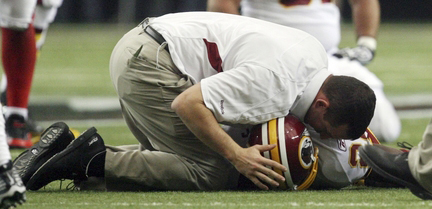
A trainer examines concussed Washington Redskins running back Clinton Portis during a 2009 regular season game. Photo from Web.
During the last two years, NFL Commissioner Roger Goodell and his cadre of policy advisors have progressively issued a set of new rules to all thirty-two teams in the league regarding concussions.
In one of the early rule changes, the Commissioner required all teams to hold a concussed player out of the remainder of a game if he is displaying certain symptoms, which include memory loss, sustained dizziness and headaches. The old practice was to hold a player out of the game only if he lost consciousness.
This change was among the first of many steps taken by the league in an effort to protect players from significant head injuries and related neurological problems that may arise later in the players’ lives.
I do not doubt the necessity of such rules, since they protect the players’ good health, but I do wonder how the league plans on enforcing them. To illustrate my concern, I offer the following scenario:
Suppose a player is tackled on the field so that he happens to hit the ground head-first (this is considered a legal tackle by league standards). He stays on the ground despite his teammates’ offers to help him up, so his team’s trainers run out to evaluate him. It seems as if he has had a minor concussion and is experiencing some dizziness. After a minute or two however, he is able to stand and speak coherently, and he believes he can stay in the game.
If the player doesn’t lose consciousness and the training staff can’t tell whether there’s been any memory loss or vision impairment, then all parties involved would assume this was a minor concussion and let the player head back onto the field. This is where problems with rule enforcement would arise.
Headaches and other “hidden” symptoms are commonly known to follow the initial impact. Indeed, according to the Mayo Clinic, “The signs and symptoms of a concussion can be subtle and may not be immediately apparent.” Since no one besides the player can become aware of these “subtle” problems, I argue that the NFL has no way of knowing whether the player and his team have violated the league’s policy.
Football players are known for wanting to play through any minor injuries they sustain on the field. Most players will not take these borderline concussion events seriously because they have a strong desire to help their team win the game. Head coaches may also try to downplay the significance of these injuries in cases where they would lose valuable, talented players if they adhered to the NFL’s ruling.
If Commissioner Goodell really is serious about preventing players from returning to the field after a concussion, he needs to implement a rule with more objective criteria. That is to say, he should mandate that any player who suffers a major blow to the head must stay out for the remainder of the game, regardless of the symptoms he experiences. The player would then be evaluated during the following week to determine if he would be medically eligible to play in subsequent games.
This would, no doubt, be an unpopular rule among players and coaches, but it’s no secret that they don’t like the concussion policies that are already in place. Last month, Hines Ward, one of the Pittsburgh Steelers’ wide receivers, criticized the concussion policy, saying “It’s football. You get your bell rung.” He, like many football players, claims that the sport is violent by nature, and that the league should leave it up to the players and their trainers to decide whether they are capable of returning to a game.
I believe this argument is flawed, for not only does it place the game ahead of one’s own well being, but it is also known that concussion patients often downplay the severity of their injuries. Because denial can stem from the concussion itself, I do not think that players are qualified to evaluate themselves after suffering a head injury.
With all of this in mind, I feel that concussed football players need to be sidelined and evaluated by impartial medical staff for at least one week, for the sake of both the remainder of their football careers and their health in general.









